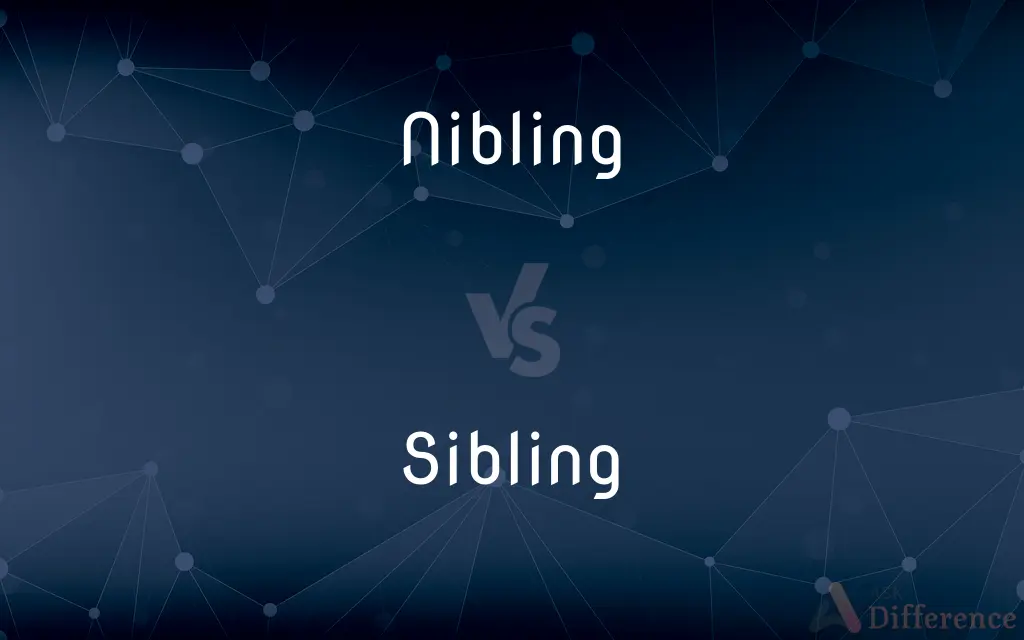Nibling vs. Sibling — What's the Difference?
By Tayyaba Rehman & Fiza Rafique — Updated on May 4, 2024
Nibling refers specifically to the nieces and nephews of a person, emphasizing a gender-neutral term, whereas sibling denotes any brothers or sisters, highlighting a direct familial bond.

Difference Between Nibling and Sibling
Table of Contents
ADVERTISEMENT
Key Differences
Nibling is a modern, gender-neutral term used to refer to the children of one's siblings, such as nieces and nephews. Whereas sibling is a broader term that includes all children born to the same parents or to one of the parents, encompassing both brothers and sisters.
The use of nibling helps in conversations where the gender of the niece or nephew is irrelevant or unknown, providing a convenient and inclusive alternative. On the other hand, the term sibling has been long established in English to describe a direct brotherly or sisterly relationship without implying any specific gender.
Niblings can be considered an extension of one's immediate family but are technically part of the extended family. Siblings, however, are always part of one's immediate family, highlighting a closer and typically more influential familial connection.
The concept of niblings is particularly useful in large families or in discussions that involve complex family dynamics. Whereas siblings play a more central role in family structure discussions, often being a focus in studies of family dynamics and individual development.
Discussions about niblings are relatively new and reflect changing societal attitudes towards family and gender neutrality. Conversely, discussions about siblings are deeply rooted in cultural, psychological, and sociological research, reflecting their fundamental role in familial relationships.
ADVERTISEMENT
Comparison Chart
Definition
Refers to nieces and nephews
Refers to brothers and sisters
Relation
Children of one's siblings
Direct members of one's family
Familial closeness
Extended family
Immediate family
Gender specification
Gender-neutral
No gender specified but direct
Societal relevance
Modern, accommodates gender neutrality
Traditional, widely recognized
Compare with Definitions
Nibling
Inclusive term used in place of niece or nephew.
Sam introduces Jamie as their nibling.
Sibling
A brother or sister.
Jenna is my older sibling.
Nibling
Used to refer collectively to children of siblings.
We’re planning a large reunion for all our niblings this summer.
Sibling
Used in both singular and plural forms.
He has one sibling, she has three.
Nibling
A gender-neutral term for a niece or nephew.
I have two niblings, one from each of my sisters.
Sibling
Predates and is more commonly used than nibling.
The term sibling has been in use since the Old English period.
Nibling
Helpful in discussions avoiding gender.
My nibling just won a school award!
Sibling
One of two or more individuals having one or both parents in common.
All four siblings shared the same childhood memories.
Nibling
Reflects modern linguistic trends towards inclusivity.
Updating our family tree made me realize how many niblings I actually have.
Sibling
Central to family structure discussions.
Sibling rivalry was always a big thing in our house.
Nibling
Used especially as a gender-neutral term: the child of one's sibling or sibling-in-law; one's nephew or niece.
Sibling
A sibling is a gender neutral word for a relative that shares at least one parent with the subject. A male sibling is a brother and a female sibling is a sister.
Sibling
One of two or more individuals having one or both parents in common; a brother or sister.
Sibling
A person who shares a parent; one's brother or sister who one shares a parent with.
None of my siblings are married yet.
Sibling
(comptheory) A node in a data structure that shares its parent with another node.
Sibling
(taxonomy) The most closely related species, or one of several most closely related species when none can be determined to be more closely related.
Sibling
A brother or a sister.
Sibling
A person's brother or sister
Common Curiosities
Can sibling refer to half-siblings and step-siblings?
Yes, sibling can refer to both half-siblings and step-siblings.
What is a nibling?
A nibling is a gender-neutral term used to refer to a niece or nephew.
Are niblings considered immediate family?
Niblings are considered extended family, unlike siblings who are immediate family.
What are the psychological impacts of sibling relationships?
Sibling relationships can significantly impact an individual's social and emotional development.
Is the term nibling widely accepted in formal contexts?
Nibling is increasingly accepted, especially in contexts emphasizing gender neutrality.
What are the origins of the term sibling?
The term sibling comes from Old English, originally meaning relative or kin.
How does one use the term nibling in a sentence?
You can say, "I am attending my nibling's graduation tomorrow."
How do siblings legally affect one another?
Siblings can have legal responsibilities for each other in cases of guardianship or inheritance.
What is the plural of nibling?
The plural of nibling is niblings.
How is the sibling bond portrayed in literature?
The sibling bond is often explored in literature, focusing on themes of rivalry, support, and development.
Share Your Discovery

Previous Comparison
Sigurd vs. Siegfried
Next Comparison
Insight vs. JudgementAuthor Spotlight
Written by
Tayyaba RehmanTayyaba Rehman is a distinguished writer, currently serving as a primary contributor to askdifference.com. As a researcher in semantics and etymology, Tayyaba's passion for the complexity of languages and their distinctions has found a perfect home on the platform. Tayyaba delves into the intricacies of language, distinguishing between commonly confused words and phrases, thereby providing clarity for readers worldwide.
Co-written by
Fiza RafiqueFiza Rafique is a skilled content writer at AskDifference.com, where she meticulously refines and enhances written pieces. Drawing from her vast editorial expertise, Fiza ensures clarity, accuracy, and precision in every article. Passionate about language, she continually seeks to elevate the quality of content for readers worldwide.
















































